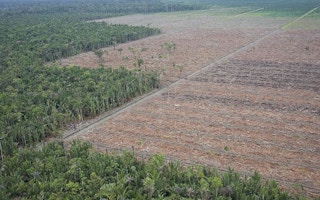Debates about REDD+ (Reducing Emissions from Deforestation and forest Degradation) are skirting a fundamental issue by failing to discuss what actually causes deforestation in the first place, a media analysis has found.
When governments, civil society and the private sector in six countries analyzed speak publicly about REDD+ — the U.N.-backed program that aims to reduce global greenhouse gas emissions by creating incentives to keep trees standing — they often avoid talking about underlying problems.
“We found that although there is a lot of discussion about international issues with REDD+, such as who should pay for what, actors don’t talk much about national issues,” said Monica Di Gregorio, a senior associate at the Center for International Forestry Research (CIFOR) and a lecturer at Britain’s University of Leeds.
“State actors and powerful interests ostensibly support REDD+, but they tend to talk about it in a superficial and simplistic way, drawing on the rhetoric of it as a ‘win-win’ situation,” Di Gregorio said. “They don’t really go into the reforms that are needed to make REDD+ happen.”
The research findings, reported in “Governing the design of national REDD+: An analysis of the power of agency,” which Di Gregorio co-authored with CIFOR scientists Maria Brockhaus and Sofi Mardiah, raise the question of whether avoiding the topic will undermine the success of REDD+.
“We know that to have effective REDD+ policies, you have to address the drivers of deforestation — there’ll be no emission reductions without that,” Di Gregorio said.
“It’s not enough just to set up projects, or to say ‘here’s a procedure’ and ‘here’s a mechanism.’ Implementing REDD+ means tackling some very challenging issues, but if they don’t talk about the real problem, they’re not going to be able to solve it.”
The “too hard” basket
Getting behind the “real problem” means tackling the causes of deforestation and forest degradation, known as the “drivers.”
A recent assessment of the direct drivers of deforestation and forest degradation in 100 developing countries found that agriculture is the cause of 73 percent of deforestation, divided between commercial agriculture (40 percent) and subsistence agriculture (33 percent). Other drivers were mining (7 percent), infrastructure (10 percent) and urban expansion (10 percent).
Timber extraction and logging were found to cause 52 percent of forest degradation (mainly in Latin America and Asia), with fuelwood collection and charcoal production (mainly in Africa) accounting for 31 percent, uncontrolled fire 9 percent and livestock grazing 7 percent.
Often underpinning these direct drivers are national policies, such as tax and trade regimes; monetary policies and economic development strategies; and market forces — all of which indirectly drive deforestation, policy analyses have shown.
Reporting national data on direct drivers is a requirement for National Communications to the UNFCCC (U.N. Framework Convention on Climate Change), which have been submitted by all six countries studied in the media analysis: Brazil, Cameroon, Indonesia, Nepal, Papua New Guinea and Vietnam.
Apart from Brazil, all of these countries have also submitted a REDD+ Readiness Preparation Plan to the World Bank’s Forest Carbon Partnership Facility, which also requires information on drivers.
Even though, for most of the study countries, information on drivers is not complete, there is little doubt that state policymakers are aware of what is causing deforestation — and that they know that policy reforms are needed.
Less clear is why they continue to avoid addressing the issue in public forums.
“My best guess is that it’s a form of political resistance,” Di Gregorio said.
“There is a perception that if countries do make real reforms or go strongly in the direction of REDD+, then they’ll have to pay for it in terms of lost development.”
For example, governments could lose substantial revenue if they decided to forgo lucrative agricultural projects that involve clearing forest, such as new oil palm plantations, in favor of REDD+.
“A lot of powerful interests are behind deforestation, in agriculture for example, and governments are very wary of the trade-offs,” Di Gregorio added.
The tough issues
Yet it is not only these interests that support “business as usual” that are skipping over the issue.
Those pushing for change in the six countries, including nongovernmental organizations (NGOs) and other civil society groups, were found to be concentrating on environmental justice, safeguards and “co-benefits” of REDD+, such as how REDD+ will affect livelihoods and whether there is equity in decision making.
While these issues are important for REDD+ policy reform, the finding reveals that civil society is not explicitly discussing the root causes, either.
“We thought that conservation NGOs in particular would have been more vocal and concerned about the drivers of deforestation,” Di Gregorio said.
“This was interesting because a lot of these actors are international NGOs, and they are quite powerful — but they also don’t address this central question.”
REDD+ may not be able to progress, then, unless governments and domestic coalitions for change start pushing these fundamental and difficult issues onto the agenda.
“If we want to implement REDD+ and get results in terms of emission reductions, we have to open the discussion,” Di Gregorio said. “This might happen anyway as REDD+ policies are developed, but the sooner these issues are addressed, the more effective policies will be.”
Di Gregorio and her colleagues are now analyzing the data to look at which issues in the REDD+ debate are the most polarizing — the issues that most need resolution but that will be the hardest to resolve.










